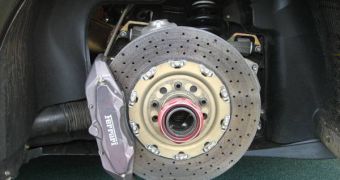Although many drivers believe they've figured out the source of the infamous squealing noise that brakes make, researchers beg to differ. They say that it's not grit on the discs that causes the noise, and neither the age that the discs themselves have. Investigators into this matter believe that only by accurately pinpointing the source of the howl can this problem be overcome, making traffic lights and train crossings around the world a much quieter place.
For example, LiveScience reports that experts Utz von Wagner and Stefan Schlagner, both based at the Technische Universitat Berlin, in Germany, have recently developed a mathematical model that takes into account all the conditions that need to be met, in order for the piercing noise to appear. The model is also useful in that it predicts what brake setups are more prone to developing squealing sounds, and at what intensities and frequencies. It also reveals how often a certain type of breaking system will make the noise, as well as the level of annoyance that it will elicit in pedestrians walking around.
According to engineers, the cause of the infernal noise is an instability that occurs within the brakes, on account of the friction forces that lead to self-excited vibrations. A team of experts from the University of Rome 'La Sapienza,' in Italy, led by Engineer Oliviero Giannini, underlines the fact that, in more than a century of driving, only minor progresses have been made in identifying and combating the cause of brake squealing. The team proposes “fuzzy dampers,” mechanisms on the wheels that could one day help suppress the piercing noises forever.
Giannini says that, “Brake squeal is caused by vibrations induced by friction forces.” Therefore, if a damper is built that can interact with these forces, and absorb some of them, at the same time without interfering directly in the breaking process, it could theoretically eliminate the source of the squeals. In a lab-based testing rig, the Italian expert was successful in creating such a damper, which reduced the level and frequencies of the screeching.
After the team has its application patent granted, it will move to sell the technology to the auto industry, which could then implement it in its newest models. Because the technology is not that complex, it's highly unlikely that the cars will get significantly more expensive once they incorporate it.

 14 DAY TRIAL //
14 DAY TRIAL //